Kim Kerry-Tyerman is a volunteer for Grameen Foundation's Bankers without Borders® initiative, based in Ghana and Kenya for eight weeks to help the BwB team develop relationships with local organizations (companies, associations, microfinance clubs and institutions of higher education) there. A graduate student in public policy at Mills College in Oakland, CA, Kim is a former AmeriCorps VISTA fellow, where she researched strategic volunteerism at the Taproot Foundation. She has dual citizenship in the US and the UK, and has volunteered on several community development projects throughout England, Eastern Europe and Africa. She says her hobbies include daydreaming, playing tennis and drinking beer. Readers of this blog might enjoy the most recent post on her own blog, Akua Yevu, in which she describes her experiences meeting with staff and clients of a microfinance institution in Ghana: Ghana moves slowly. Meals at restaurants can take an hour to arrive and the mud sidewalks are crowded with ambling pedestrians who stop to chat frequently. Last night a friend told me about checking in on an item he had ordered from a vendor; when he asked when it would be ready, the response was, "for sure maybe tomorrow." This is at once the most wonderful and most frustrating characteristic of Ghanaian life. Something I really wanted to do on this trip was meet at least one microfinance client to see for myself if a small loan really made a tangible difference. Recognizing the sluggish speed of life and acknowledging my short time here, I wasn't too optimistic that I'd get the opportunity. But as those who have come to know Ghana understand, things have a way of working out in ways you can't anticipate.

The view from Hillburi, Aburi, Ghana.
The first MFI I met with last week was impressive from the moment I entered the office. I did not expect them to be in a five-story office building with glass walls and cubicles, nor did I think that my flip flops and sundress would render me embarrassingly underdressed. A team of three men in sharp suits, including the CEO, ran me through a well-prepared Powerpoint on their background and operations. They base their banking on mobility; that is, their loan officers each have a mobile phone and a mobile printer through which they can serve hundreds of customers in remote villages throughout their target regions. Customers receive a printed receipt while their information is sent from the phone back to an impressive information management system (that the company developed internally) so that the head offices can keep track of individual balances, outstanding loans, and agent collections. This model is limitless, especially in terms of reaching customers in remote areas who lack access to financial services the most. After an hour or so I thanked them for their time, and left the meeting more than satisfied. >> Continue reading Kim's blog

